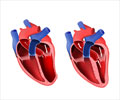Researchers have revealed that an infusion of blood that is "supersaturated" with oxygen (SS02) can reduce the amount of damaged heart muscle immediately following a life-threatening heart attack.
This is a finding made during a clinical trial, published in Circulation: Cardiovascular Interventions."The benefit of this therapy increased with the scope of the heart attack," said Dr. Gregg W. Stone, lead author and professor of medicine at Columbia University College of Physicians and Surgeons and director of cardiovascular research and education in the Center for Interventional Vascular Therapy at NewYork-Presbyterian Hospital/Columbia University Medical Center.
"The data show that heart muscle can be saved even after severe heart attack," added Dr. Stone, who is also the immediate past chairman of the Cardiovascular Research Foundation in New York.
The AMIHOT-II study focused on patients having the most serious types of heart attacks - those with anterior ST-segment elevation myocardial infarctions (STEMIs) - and on those treated within 6 hours.
Nearly half of the 733,000 Americans who suffer acute coronary syndromes-heart attack or chest pain-each year have a STEMI, according to the American Heart Association.
When a large area of the heart is damaged, heart failure is more likely, and catheter-based percutaneous coronary intervention is a procedure that can effectively open blocked arteries in STEMI patients, Dr. Stone said.
Advertisement
The size of the "infarct zone"-the amount of damaged tissue-was significantly reduced in the patients that received the "supersaturated" oxygen.
Advertisement
Besides that, at 30 days after the treatment a key safety measure-the rates of major adverse cardiac events-were not statistically different between the two groups.
Source-ANI
RAS















